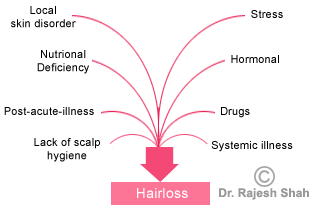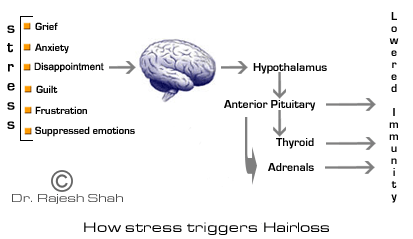Causes for Hair Loss
There may be one or multiple factors leading to hair loss, which may be summarized as under:

01 Genetic tendency
02 Nutritional deficiency (Iron, Protein, zinc, etc.)
03 Local factors (Skin diseases like Psoriasis, Lichen Planus, etc.)
04 Hormonal factors (Hyper or hypothyroid, menopause)
05 Systemic disease (Liver disease, kidney failure)
06 After acute ailments (Viral infection, Typhoid)
07 Stress factors (Anxiety, depression)
08 Drugs (Beta-blockers for hypertension, chemotherapy, anticholesterol drugs, etc.)
09 Unknown factors
Male pattern baldness tends to be genetic in nature and is associated with high levels of circulating testosterone hormone, which gets converted to dihydrotestosterone (DHT), which binds the root of the hair follicle, triggering hair loss.
1. Local factors:
Some of the local factors or conditions associated with hair loss are:
a Local skin disorder:
Certain local skin ailments are known to lead to hair fall. Local skin infections such as Fungal infection (Tinea capitis), pyoderma, secondary syphilis, etc. Non-infectious conditions such as Dandruff, psoriasis, lichen planus, eczema, etc.
b Local exposure to toxins:
Overuse or abuse with chemical-based shampoos, soaps, and lotions are known to produce hair falling.
c Scalp carelessness:
Unhygienic measures in scalp care may lead to hair falling. For instance, infrequent head washes, overexposure to the harsh sun without protection, exposing the head to industrial fumes, etc.
2. General factors:
a Deficient Nutrition:
Overall, all deficiencies of nutrition may affect the growth and quality of hair. Deficiency of vitamins B Group, Vitamin A, may lead to hair falling. Deficiency in proteins, iron, and certain minerals may affect hair growth, leading to hair falling. Iron deficiency due to a wide range of reasons, such as excessive bleeding restricted intake of iron forms an important cause of hair fall, especially found in females. The deficiency as above may be either due to faulty intake or may have occurred due to certain systemic disorders such as Mal-assimilation or mal-absorption syndrome. It may occur following any prolonged acute or sub-acute diseases, such as Irritable Bowel Syndrome.
b Hormonal variations:
Certain hormones, including androgen, estrogen, and progesterone variations, during different phases in life may bring about hair falling in excess. Thyroid hormones form another important group of disorders responsible for hair falling in some cases. Menopausal age hence makes one prone to having hair fall. Post-pregnancy and childbirth are another example.
c Post-acute-ailment:
Certain acute diseases are known to leave behind a weakened vitality, leading one to have hair fall. For example Pneumonia, viral infections, typhoid, etc.
d Medicine and Drug-induced:
Certain chemical medicines have known toxicity on the hair roots and growth. Long-term use of chemotherapy, cancer medication, steroids, antibiotics, antiepileptic, antihypertensive medications, etc. has been observed to produce hair falling in some patients, as per a study at our center. Contraceptive tablets are also known to induce hair falling.
3. Psychological factors:
The mind plays a vital role in maintaining health in general and developing a wide range of disorders, such as hair falling in particular.
Emotional stress is an epidemic condition prevailing in the world today. There is no single emotion, which may be figured out as a victim. In our experience, any and every emotion which was experienced intensely may cause a constitutional disorder affecting the physiological functioning of the hair growth.
Some of the examples of emotional stress may be summarized in brief as Intense anxiety about an important matter. Sadness or depression in one's life, which may be arising after marital disharmony or job dissatisfaction unhappy social structure, etc. Grief due to unexpected events in one's life such as loss of a family member, loss of business, major setbacks in life, etc. A long-standing fear and apprehensive habit. And so on. Similarly, certain unhealthy attitudes, such as aggressive behavior, violent expressions, hurried and impatient behavior.
To put it in nutshell, the personality type plays a greater role in most cases of hair falling and that should, in turn, be the major criterion to decide the correct line of treatment for hair fall.

4. Miscellaneous:
Some lesser common factors are industrial toxins, intoxicated water (with high levels of minerals and metals), local dermal infection, local allergic ailment, etc.

Written & Approved by-
Dr. Rajesh Shah
M.D. (Hom.)